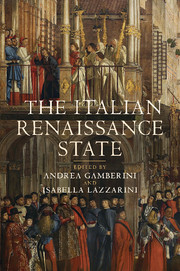Book contents
- Frontmatter
- Contents
- Notes on the contributors
- Note on translations and usage
- Map
- Introduction
- Part I The Italian states
- 1 The kingdom of Sicily
- 2 The kingdom of Naples
- 3 The kingdom of Sardinia and Corsica
- 4 The papal state
- 5 Tuscan states: Florence and Siena
- 6 Ferrara and Mantua
- 7 Venice and the Terraferma
- 8 Lombardy under the Visconti and the Sforza
- 9 The feudal principalities: the west (Monferrato, Saluzzo, Savoy and Savoy-Acaia)
- 10 The feudal principalities: the east (Trent, Bressanone/Brixen, Aquileia, Tyrol and Gorizia)
- 11 Genoa
- Part II Themes and perspectives
- Bibliography
- Index
6 - Ferrara and Mantua
Published online by Cambridge University Press: 05 August 2012
- Frontmatter
- Contents
- Notes on the contributors
- Note on translations and usage
- Map
- Introduction
- Part I The Italian states
- 1 The kingdom of Sicily
- 2 The kingdom of Naples
- 3 The kingdom of Sardinia and Corsica
- 4 The papal state
- 5 Tuscan states: Florence and Siena
- 6 Ferrara and Mantua
- 7 Venice and the Terraferma
- 8 Lombardy under the Visconti and the Sforza
- 9 The feudal principalities: the west (Monferrato, Saluzzo, Savoy and Savoy-Acaia)
- 10 The feudal principalities: the east (Trent, Bressanone/Brixen, Aquileia, Tyrol and Gorizia)
- 11 Genoa
- Part II Themes and perspectives
- Bibliography
- Index
Summary
Introduction: the historiography
Over forty years ago, Philip Jones declared that ‘the “Renaissance state” is a fiction to be banished from the books’. He arrived at this provocative conclusion at the end of a review of the policies and achievements of the signorie (city-lordships) and principalities of fourteenth- and fifteenth-century Italy, mainly focused on Lombardy under the Visconti, but also referring to the dynasties of the Este in Ferrara, the Gonzaga in Mantua and the Malatesta in the Romagna. The course of his argument was as follows: if the Renaissance state is defined as ‘unitary, absolute and secular’, there was some reality to this description. There was some redistribution of power, as lords determined the activities of civic councils, appointed all important officials and intervened in justice and law. There was also an assertion of princely authority over rural nobles, clans, guilds and clergy, and evidence of movement towards greater equity in justice and taxation ‘between different classes and different parts of their dominions’. Nevertheless, such advances were outweighed by two factors, one relating to the power of the lords, the other to the resistance of other centres within their dominions. The signoria, Jones argued, was largely conservative, not innovative: it retained inherited forms and institutions of power across the range of its activity (administrative, fiscal, legal, military), and it sought to authorise, not eradicate, privilege. On the other hand lay ‘the obstinate survival of diversity and privilege’ manifested in strong local sentiment, local statutes and local customs. Between continuity and change, Jones, as in most of his writing, favoured continuity.
Since this first formulation of Jones's argument, it almost goes without saying that the ‘Renaissance state’ has not been banished. For a long time, a persistent view continued to place the transition from medieval to modern in the Renaissance period and equated modernisation with centralisation (concentration of power, limitation of local autonomy, development of capital cities and courts) and with bureaucracy (government by officials with norms, systems and memories).
- Type
- Chapter
- Information
- The Italian Renaissance State , pp. 112 - 131Publisher: Cambridge University PressPrint publication year: 2012



